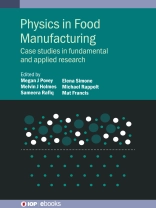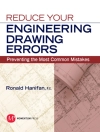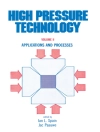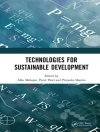This book is the first authoritative text on the role that physicists play in solving the inherently multidisciplinary science and technology challenges in food manufacturing. Topics range from designing safe, nutritious and great-tasting foods to the process technology and manufacturing know-how needed to deliver compelling product innovation. The book provides a foundational resource for the transformation of engineering and materials characterisation in the food and pharmaceuticals industries. It is an essential reference for interdisciplinary physical scientists, food/nutrition scientists and engineers working in academic research, government labs and industry, and it is also a valuable resource for R&D staff and product engineers working for suppliers of specialist instrumentation and equipment to the food processing industry. The book is augmented by complementary presentations from the Fourth IOP Physics in Food Manufacturing Conference 2020, held in Leeds, UK.
Key Features
- The first authoritative account of the diverse role that physics and physicists play in the food processing industry.
- A go-to reference source for anyone wishing to become involved in food processing – science, technology, engineering.
- Expert accounts by leading academics and industrial scientists.
About the author
Megan J Povey leads the Food Physics Group in the School of Food Science and Nutrition at the University of Leeds. She was the first person in the world to hold a university chair in food physics being appointed in 2002 and has 50 years of experience in the use of ultrasound for the characterization of soft materials. Her group is internationally leading in the area of ultrasound characterization of nano-particulate material, primarily but not exclusively food particles such as the self-assembling protein casein. Elena Simone joined the School of Food Science and Nutrition at the University of Leeds in September 2016 as a lecturer in food crystal engineering. Her research interests include crystal engineering, understanding the phenomena of polymorphism, nucleation and crystal growth using on-line, in situ, analytical techniques as well as off-line solid state characterisation, and exploring novel technologies and non-invasive techniques for food safety and reassurance. Melvin J Holmes has been involved in research and teaching since 1997 in mathematics and food science. He has primary research interests in the use of partial and ordinary differential equations to model physical systems, in particular in visco-inertial and thermal interactions of emulsions with incident sound fields. These models in conjunction with experimental results allow a valuable insight into the complex interactions that occur in real systems.
Michael Rappolt holds a leadership chair of lipid biophysics at the School of Food Science and Nutrition at the University of Leeds. He is a physicist and a leading authority on the use of various small and wide-angle scattering techniques on investigating the structure, shape and flexibility of model membranes with various, groundbreaking achievements concerning their nanostructural and mechanical analysis. Recent activities have been concentrated on the study of drug/membrane interactions with applications to drug delivery and food. His research vision is to enforce building bridges between physics (nanostructure of self-assembled soft matter), biology (biointerfaces), chemistry (response of membranes to environmental changes) and applied research (food, health and bioenergy sectors).
Sameera Rafiq is a research officer in the School of Food Science and Nutrition at the University of Leeds. She has experience in editing and presenting in various contexts including television and has organised a number of large successful conferences, including the Physics in Food Manufacturing conference held in Leeds in January 2020. She specialises in promoting food science on social media and in publications.
Mat Francis uses physical and chemical principles to improve engineering processes in the food, water and energy sectors. He has undertaken research into different applications of 3D printing using inputs such as extrudable food and flexible plastics and has provided public demonstrations of 3D printing, as well as creating a free Future Learn online digital module, which included a section on how food 3D printing could be integrated with existing unit operations.












